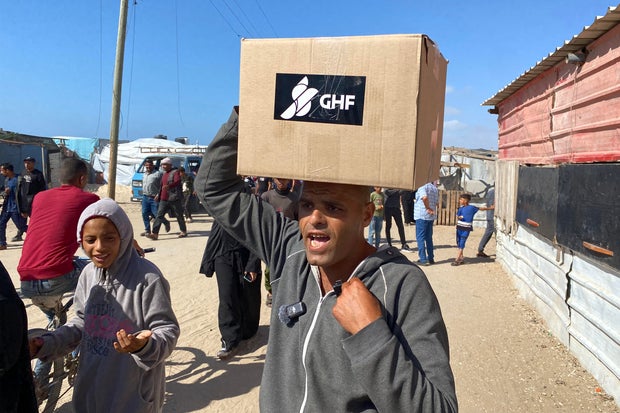“The Swiss GHF Board and Executive team will closely mirror that of the U.S. GHF and will adhere to the same principles, mission and values,” says the document.
A separate document seeking to register the Gaza Humanitarian Foundation in Switzerland, dated Jan. 31, 2025, was published as part of the country’s commercial register. The foundation is shown as being registered from Feb. 17.
According to the Swiss registration document, “the foundation pursues exclusively charitable and philanthropic objectives for the benefit of people in need of support for material, psychological or health reasons, and more specifically to provide humanitarian aid to those affected by the conflict in the Gaza Strip, including the secure provision of food, water, medicine, shelter and reconstruction.”
AFP via Getty Images
It lists three individuals as leaders of the Swiss foundation: David Papazian, who the document says is from Armenia but based in the U.K.; Lolk Samuel Marcel Henderson, an American in Arlington, Virginia; and David Kohler, from Switzerland.
Subsequent documents, dated May 19 and May 23 respectively, announced the removal of Swiss national Kohler from the board of the foundation, and then the end of Swiss accounting firm OGH Expertises Comptables et Fiscales SA’s role as an auditor of the foundation.
The ESA said the aid group’s Swiss branch does not have the required signatory member of its board resident in Switzerland, that it doesn’t have the minimum three board members required by Swiss statutes, and that it did not appear to have a Swiss bank account, a valid Swiss address, or an auditor — all of which are requirements for foundations like GHF which are registered in the country.
A Swiss non-governmental watchdog organization, TRIAL International, said it had filed two legal submissions to the Swiss government on May 20 and 21, with the Federal Supervisory Authority for Foundations and the Federal Department of Foreign Affairs, seeking to assess GHF’s compliance with the Swiss legal system, as well as with Switzerland’s Federal Act on Private Security Services Provided Abroad.
The legal submissions were “intended to urgently remedy potential breaches by the GHF of various rules of national and international law, in particular concerning ‘private security services’ within the framework of the foundation’s activities, such as the militarized security of distribution points and the control of individuals,” the NGO said in a statement.
“So we just wanted to understand what they did” through the Swiss entity, he said.
Grant said it was unclear how much GHF activity had actually taken place in Geneva, which was part of the motivation for his group’s submissions. It was also looking to find out whether GHF had requested and received necessary approvals to engage private military services, the use of which is tightly regulated under Swiss law for organizations registered in the country.
“They are undignified. They are inhumane. We’ve seen people being corralled into cages in the baking heat,” Smith said.
Smith pointed out concerns raised by the United Nations, which has declined to work with the organization, about the methods of GHF and even “some of the people that, until the last couple of days, worked for GHF and have since resigned, saying that they cannot adhere to the humanitarian principles if they continue to work for this entity.”
“The risks posed by armed military actors, particularly those who are parties to a conflict, also providing humanitarian assistance should be and has been roundly condemned and is not something that any reputable humanitarian organization, academic of humanitarianism or humanitarian practitioner should ever support,” Smith said.
Imtiaz Tyab
contributed to this report.





